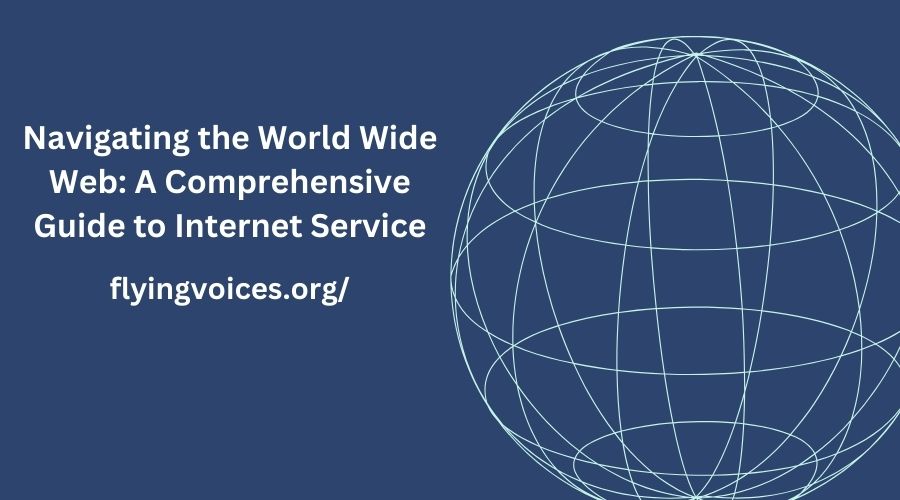
Reliable internet access is become a need rather than a luxury in the modern digital era. An internet connection that is both fast and trustworthy has become essential for many aspects of everyday life, including business, education, entertainment, and keeping up connections with loved ones. We’ll cover everything you need to know about internet service in this extensive guide, from selecting the best provider to understanding various connection types and optimizing your online experience.
Understanding Internet Service: The Backbone of Connectivity
The technology and infrastructure which enable users to connect to online resources and use the internet are the fundamental elements of internet service. It includes a broad spectrum of technologies and distribution techniques, each with unique advantages, limitations, and applicability for various use cases. To better understand, let’s explore all of the facets of internet service:

Types of Internet Connections
DSL (Digital Subscriber Line): DSL offers high-speed internet access by making use of the current phone lines. It is readily available in suburban and urban locations and provides a reliable connection.
Cable Internet: Coaxial cables are required for cable internet in order to provide service. It is well-known for its quick speeds and broad availability, especially in crowded, urban places.
Fiber Optic Internet: Data is sent at the speed of light over lines of fiber optics while using fiber optic internet. While it is the fastest and most dependable internet connection accessible, its availability may be limited, especially in cities.
Satellite Internet: Satellites in Earth’s orbit are used to supply internet access via satellite internet. It’s an excellent option for remote and rural locations where other internet service choices may not be available.
Fixed Wireless Internet: Radio transmissions are used by fixed wireless internet to provide internet access to certain areas. It’s often used in remote locations where it could not be feasible to erect satellite dishes or run cables.
Factors to Consider When Choosing an Internet Provider:
Speed: If you participate in online activities like gaming, streaming video, or remote work, take into account the amount of bandwidth you will require. Select a connection to the internet whose speed will accommodate your internet usage patterns.
Reliability: Seek for a provider of internet services with a solid uptime and reliability record. Read consumer reviews and speak with friends or neighbors about their experiences with different suppliers of services.
Availability: Find out which types of internet connections are available wherever you live and look into regional service providers. Take into account elements like investment in infrastructure and coverage region.
Cost:To strike a balance between cost and service quality, evaluate the price packages offered by many internet service providers. Consider any reductions, special deals, and additional costs.
Customer Service: Assess the level of technical assistance and customer care provided by internet service providers. Seek for companies with competent personnel and quick-to-respond support channels.
Optimizing Your Internet Experience: Tips and Best Practices
There are a few things you can do to improve your internet experience and guarantee lag-free access after selecting an internet provider and committing to a service plan:
Position Your Router Strategically: To have the best possible coverage and signal strength, place your router in the center of your house or place of business. Steer clear of obstructions including furniture, walls, and electrical equipment that might impede Wi-Fi signals.
Secure Your Network: Use a strong password and encryption to secure your Wi-Fi network in order to keep unwanted users out and protect your personal data. Update the firmware on your router on a regular basis to fix security flaws.
Use Wired Connections When Possible:
Wired Ethernet connections are a better option than Wi-Fi for devices that need a steady and fast connection, such game consoles and desktop PCs. More dependable and quicker rates are offered by Ethernet relationships, especially for activities needing a lot of ability.
Manage Bandwidth Usage: Use your router’s quality of service (QoS) settings to allocate bandwidth and give priority to the most essential applications and devices. During peak hours, limit bandwidth-intensive activities like uploading enormous documents or streaming videos to make sure everybody has a consistent internet experience.
Update Software and Devices: Update the software and security patches on all of your devices, including computers, cellphones, and smart home appliances. Updates often feature bug fixes and speed enhancements that might improve your online experience.
Monitor Network Performance: To check the reliability, latency, and speed of your internet, use programs and services for network monitoring. Identify any bottlenecks or performance problems, and solve issues with connections as soon as possible.
Consider Network Upgrades: Think about upgrading your internet service package or purchasing extra networking hardware, such as a mesh Wi-Fi system or range extender, to boost coverage and performance if you often have poor speeds or connection problems.
The Future of Internet Service: Innovations and Trends
In the future, as infrastructure and technology continue to progress, the internet service environment will continue to change. The following significant developments and trends will affect internet access in the future:
5G Wireless Technology: In comparison to current cellular networks, 5G wireless technology adoption promises faster speeds, reduced latency, and more dependability. 5G has the ability to completely transform mobile communication and open up new possibilities for applications like Internet of Things (IoT), augmented reality (AR), and virtual reality (VR).
Expansion of Fiber Optic Networks: Investment in fiber optic infrastructure to provide gigabit-speed internet to households and companies is rising in tandem with the growing demand for high-speed internet. Fiber optic networks are an attractive choice for future-proofing internet access as they provide unparalleled speed and dependability.
Internet of Things (IoT) Connectivity: For internet service providers, the rise of IoT devices—such as wearable technology, smart home appliances, and industrial sensors—brings both new possibilities and difficulties. Scalable and secure connection solutions are becoming more and more necessary to enable connected devices and applications as IoT use increases.
Cloud Gaming and Streaming: Low-latency, high-bandwidth internet connections are growing more and more in demand as cloud gaming platforms and streaming services like Google Stadia, NVIDIA GeForce Now, and Microsoft xCloud become increasingly common. In response to the demands of gamers and streaming fans, ISPs are adjusting their offerings by giving priority to network optimization and creating particular apps.
Internet Accessibility Initiatives:For governments, investors, and lawmakers, bridging the digital gap and ensuring that all individuals have access to affordable internet service continue to be major objectives. The goal of initiatives like community-based connection projects, subsidized internet programs, and rural broadband development is to promote digital inclusion and reduce deficiencies in internet access.
Conclusion: Unlocking the Power of Connectivite
In short, internet access is vital for the growth of our globalized society and helps individuals, businesses, and communities prosper in the digital era. You may realize the full potential of the internet and have effortless access to communication, entertainment, and information by learning about the many kinds of internet connections, choosing the best provider, and putting best practices for connectivity into practice.
As technology develops and connection becomes more and more necessary for our everyday activities, it’s critical to keep up with the latest developments, trends, and possibilities in the internet service industry. Reliable internet access is essential for being connected and involved in a world that is changing all the time, whether you’re using it for streaming your favorite TV programs, holding remote work meetings, or looking up new destinations online.
